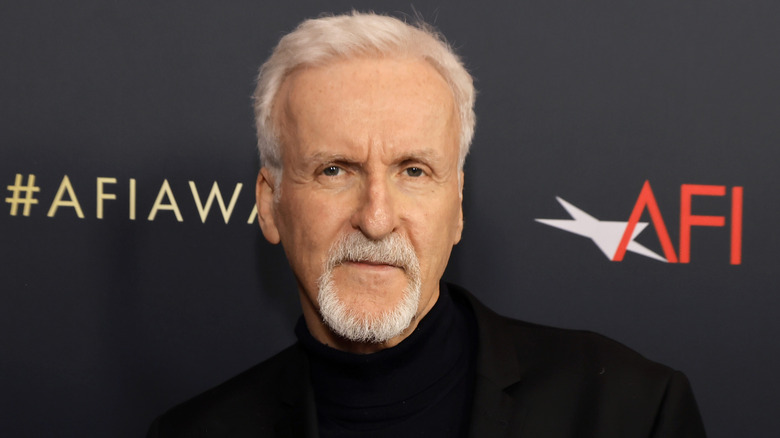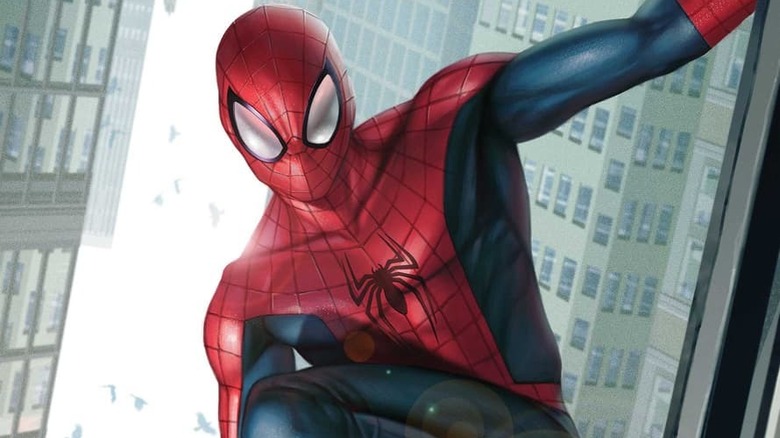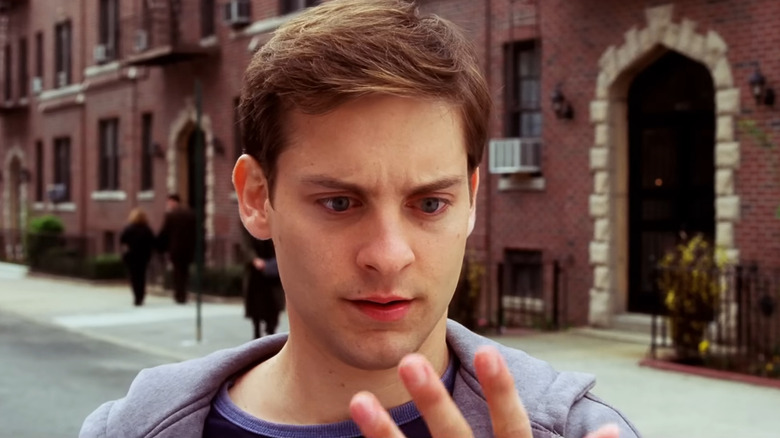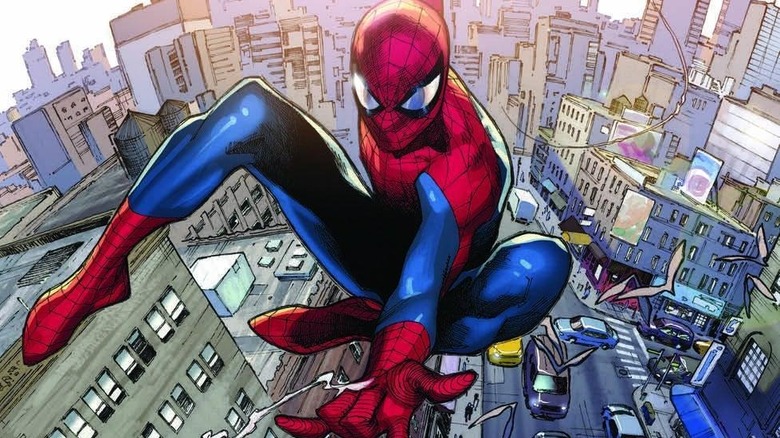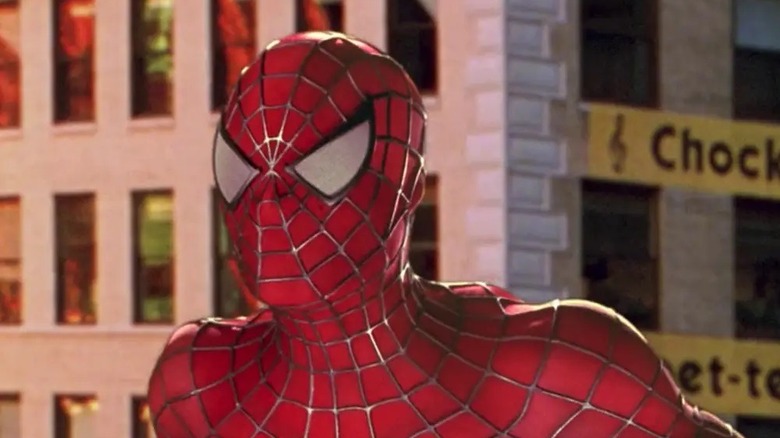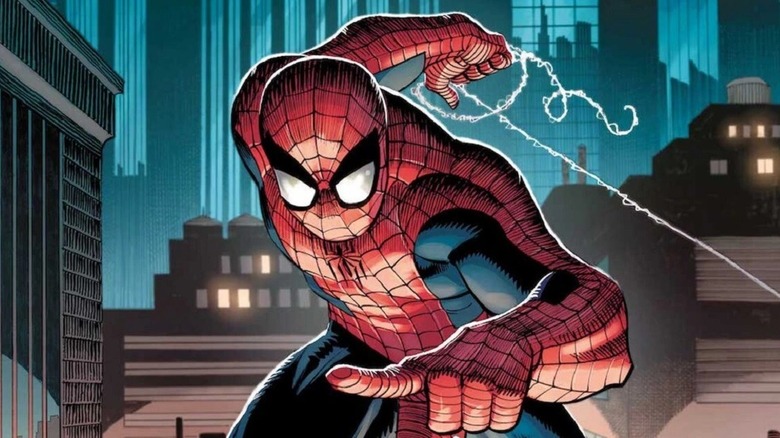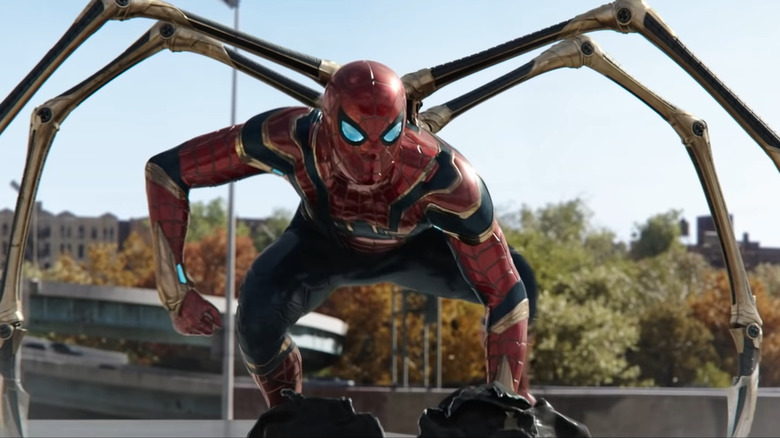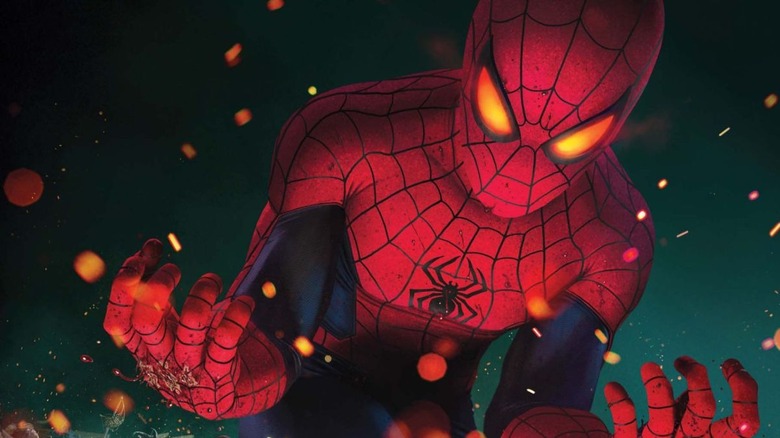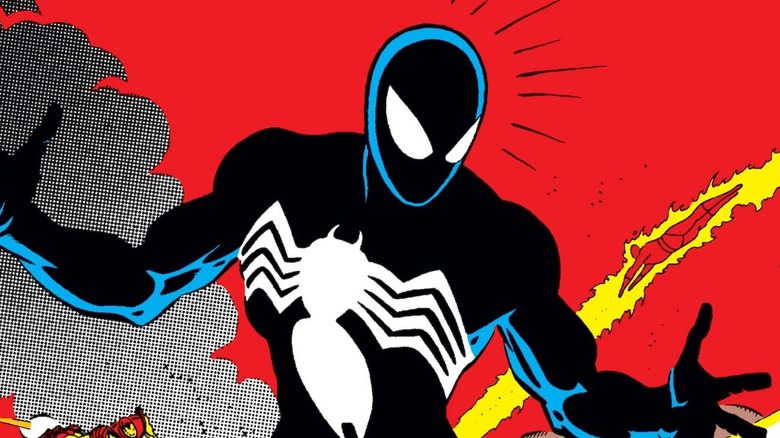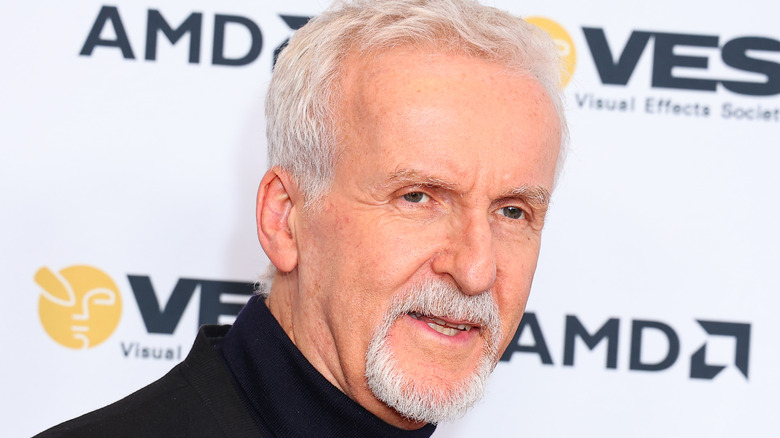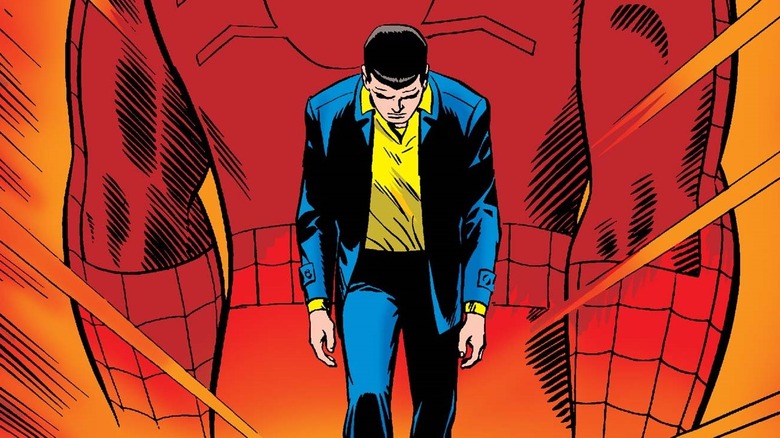Why James Cameron's Spider-Man Never Got Made
Before James Cameron broke box office records with "Titanic" and "Avatar," before he took offense to all the "Does anyone even remember 'Avatar'?" jokes, and before he pulled over $2.2 billion for the sequel, "Spider-Man" had his filmmaking senses tingling.
Marvel's web-slinger had a complicated cinema history in the '90s. The rights had lingered at Cannon Films in the '80s, where the studio famous for creating blockbusters with pennies envisioned the character as an actual eight-legged superhero. When opportunity presented itself, and at the behest of Cameron himself, Carolco Pictures grabbed hold of the film rights. At this point, Cameron was poised to write, direct, and produce "Spider-Man." It was a dream project, and he worked on it for a few years in an attempt to craft a picture-perfect story for Peter Parker. However, Hollywood is renowned as the Boulevard of Broken Dreams for a reason. Cameron's "Spider-Man" swung off the cliff after a few laps.
It wasn't all for nothing, though, as certain elements of Cameron's proposed movie found their way into Sam Raimi's "Spider-Man." That being said, many fans ponder the big what-ifs. With Cameron's impressive track record, his version of Spidey could have kickstarted the superhero movie boom even earlier. Let's dig a little deeper and unravel the web to find out more about his failed "Spider-Man" film.
The script was too edgy
James Cameron's "Spider-Man" "scriptment," which is a long film treatment with dialogue and screen direction, has become something of a Hollywood legend. According to Rebecca Keegan's book "The Futurist: The Life and Films of James Cameron," Spidey creator Stan Lee absolutely loved it. Ultimately, many elements of the script — which has been leaked and even illustrated online — made it into the Sam Raimi-directed film that ultimately saw release in 2002, though Cameron never received even informal credit. See if any of this rings a bell: Peter's fever dream/waking up not needing his glasses; Mary Jane as his love interest; Uncle Ben's carjacking death; Peter's indifference while an employer gets robbed; and most notably, Spider-Man's organic, not man-made, web shooters. If you're now saying to yourself, "Wait, that's like, the whole Tobey Maguire movie" ... yeah, it pretty much is, and those elements were all in Cameron's version.
But he also has Peter peeping in Mary Jane's window while she gets dressed, then later shows them having sex on the Brooklyn Bridge while Peter describes the creepy way that spiders mate. Uh, what? Also, Peter uses intense profanity throughout the story, to the point that it would be completely inappropriate for kids (and most likely R-rated, as the majority of Cameron's films had been to that point). Production never advanced far enough for a final, greenlit screenplay to get developed, so who knows whether Cameron could have been persuaded away from the edgier stuff, although his history suggests he would have wanted to make "Spider-Man" his way or not at all.
The budget was probably too low
James Cameron would likely have made "Spider-Man" right after "Terminator 2," which had a $100 million dollar budget. According to Janet Wasko's "How Hollywood Works," Carolco only gave Cameron $50 million to work with — a huge step backwards for him. And if the reported budgets of his next two films, "True Lies" ($100 million) and "Titanic" (a record-setting $200 million) tell us anything, it's that Spidey's balance sheet wasn't going to fly. The script has Spider-Man fighting both Electro and Sandman, as well as multiple scenes atop the World Trade Center. None of those set pieces would have come cheap.
The casting was wrong
There were consistent rumors that James Cameron wanted to cast Arnold Schwarzenegger as Doc Ock, and, given his history with the Austrian strongman, they're easy to believe. Schwarzenegger even intimated his involvement in an interview with Empire, only going so far as to vaguely say the studio opted for a different path. The laughable "Batman & Robin" would prove Arnie indeed had comic book movie aspirations (albeit misguided ones). But Cameron's script didn't even feature the villain, so who knows if there were further talks.
According to Moviepilot's breakdown of Cameron's dream cast, however, there were other strange choices. For example, Edward Furlong was supposed to be Peter Parker. Leonardo DiCaprio also circled the project and read an early screenplay. In all honesty, we don't think either of them would have worked. With the hindsight from "Spider-Man 3" at our disposal, we already know what an emo Peter Parker looks like, and it's not good. They also cite Drew Barrymore as Gwen Stacy, which would have been fine, and R. Lee Ermey, who played the drill sergeant in "Full Metal Jacket," as J. Jonah Jameson. That would have been perfect, but nailing the casting of a guy who probably has 10 lines at best wouldn't have been enough to make up for tanking the principal cast.
Litigation over film rights
While the script, casting, and budgeting issues all could have become later stumbling blocks, what ultimately squashed James Cameron's "Spider-Man" were legal issues. Cameron told Collider that when Carolco collapsed — which happened a few years after they acquired the rights to Spider-Man – he already had "Titanic" in his sights and no longer wanted to pursue it, because there were too many competing interests for the rights. A number of former writers and producers all claimed to have had a hand in developing the project, and they all came calling after Marvel's 1996 bankruptcy scattered multiple holding deals to the wind. "How Hollywood Works" details how, after Marvel recovered from bankruptcy, they basically paid off everyone who was trying to sue for the rights to Spider-Man, which in turn freed them up to once again sell the film rights, this time to Sony. Sony has since gone on to make many Spider-Man films and more than $2 billion in franchise revenues.
Meanwhile, Cameron turned one of the greatest maritime tragedies of all time into a billion-dollar smash, so don't feel too bad for him. He didn't get to make his favorite comic book movie and might have missed out on making a ton of Spider-cash, but don't worry — he still did just fine.
It would have kickstarted a series of Spider-Man films
No one can accuse James Cameron of thinking small. The filmmaker believes in the potential of franchises, hence the number of sequels his films usually produce. (Although the likelihood of an official "Titanic 2" still seems rather slim, unless Jack Dawson comes back as a zombie or indulges in an oceanic twist on "The Crow.") Expectedly, he didn't look at "Spider-Man" as a one-off feature, as he revealed to Collider. "I got Carolco Pictures to buy 'Spider-Man,'" he said. "I was going to launch that as a series of films."
In the same interview, Cameron noted how Marvel's characters were being misused by the studios of that era. He was correct: Comic book movies still weren't in vogue in the early '90s. Despite the success of Tim Burton's 1989 "Batman" film, Marvel properties lagged behind, mostly confined to direct-to-video or television movies, such as "The Death of the Incredible Hulk" and 1990's "Captain America." Cameron saw an opportunity to do more with the genre and its characters, and no one would have bet against him laying the foundation for a prototype version of the Marvel Cinematic Universe in the early '90s.
Would it have stayed faithful to the source material?
Watching a filmmaker change a legacy character for a screen adaptation can be hugely frustrating to a comics fan. With an abundance of rich source material at their fingertips, it seems silly to reinvent the wheel, right? But the reality is, some comic book elements don't translate well to the live-action sphere and need to be tweaked. Moreover, a film can only hold so much story in its limited runtime. Therefore, certain nuances and creative liberties need to be taken for the benefit of the script.
Speaking to ScreenCrush, James Cameron stated that he consulted with Stan Lee while putting together the treatment for his proposed "Spider-Man" film. "I didn't make a move without asking him permission," he said. While Cameron picked Lee's brain, this doesn't mean his film would have followed the source material to a T, as is revealed by the leaked scriptment. In Cameron's movie, Peter Parker wouldn't have been bitten by a radioactive spider; instead, the spider would have been an experiment that involved the transfer of DNA. Additionally, the main antagonist would have been Electro. However, he wasn't the Max Dillon character from the comics. In this version, he would have been a ruthless businessman named Carlton Strand. Sandman would have also featured, but his name would have been Boyd, not Flint Marko. Of course, it's possible this could have all been altered before the film went into production.
James Cameron's Spider-Man would've been Spider-Kid
In a discussion with ScreenCrush, Cameron discussed his specific version of "Spider-Man," which sounds a lot like the original character introduced in 1962's "Amazing Fantasy" #15. "The first thing you've got to get your mind around is it's not Spider-Man," the director said. "He goes by Spider-Man, but he's not Spider-Man. He's Spider-Kid. He's Spider-High-School-Kid. He's kind of geeky and nobody notices him and he's socially unpopular and all that stuff."
The leaked scriptment does indeed stress the character's youth and journey through puberty. There's even a scene where Peter Parker pops his zits in the mirror before school. Interestingly, Cameron's take isn't too far from the MCU's version of Spidey, as portrayed by Tom Holland. The celebrated filmmaker understood the key element of what makes this character so compelling, which Marvel Studios now highlights: He's still trying to discover who he is as a person, while also dealing with his identity as a superhero.
What the concept art for James Cameron's Spider-Man looks like
Truthfully, Spider-Man fans have been blessed when it comes to live-action adaptations of his famous costume. While many debate which suit is best, no version has ever been terrible — including Nicholas Hammond's outfit from 1977's "The Amazing Spider-Man" TV show.
While a physical suit was never developed for James Cameron's "Spider-Man" — that we know of — the filmmaker revealed concept art of what his vision for the character would have looked like in "Tech Noir: The Art of James Cameron." Set in the nighttime, his drawings show Spider-Man in his traditional costume, climbing up the side of the building while the streets bustle busily below. The colors aren't extremely vivid or bright, suggesting a slightly darker tone for the character and the movie as a whole. Alternatively, it could simply look this way because it's a shot of the character in the evening.
Fan reaction towards this concept art was mixed. One Twitter user said, "This suit design is banger actually," while others complained that the lenses don't look quite right. Reddit was just as divided. Some users noted how grateful they were the film was never made, while others defended Cameron's artistic choices, stating his darker version of Spider-Man could absolutely have worked.
Spider-Man may have worn the symbiote suit
While James Cameron's main piece of concept art features Spidey in his traditional red and blue garb, an alternate version appears in "Tech Noir: The Art of James Cameron." It's the exact same picture put through a shadowy blue filter. The webbing design of the original costume vanishes, leaving Spider-Man in a sleek dark outfit. Naturally, one thought comes to mind here: the symbiote suit.
Spider-Man first wears the fabled suit in 1984's "Marvel Super Heroes Secret Wars" #8. The alien symbiote from which it's derived has since become an important part of comic book mythology. Venom, the symbiote in question, experienced a surge in popularity as an antihero in the early '90s, thanks to David Michelinie and Mark Bagley's "Venom: Lethal Protector" limited series. It's likely Cameron was well aware of what was happening in the fandom and had this story percolating at the back of his mind. While Cameron's scriptment doesn't seem to be inspired by the original symbiote saga, the filmmaker may have considered it for the film series. This might have been his attempt at seeing how it would translate to his vision.
Cameron called it the 'greatest movie' he 'never made'
James Cameron doesn't seem like the kind of filmmaker to cry over spilled milk. Wherever he goes, success follows him; this has carved his legacy as one of the greatest directors of all time. He also understands the volatile nature of the movie business, and that not everything will pan out as expected. That being said, "Spider-Man" appears to be the one that got away. In "Tech Noir: The Art of James Cameron," Cameron called it "the greatest movie I never made." Considering elements of his scriptment were used in other "Spider-Man" movies, it's highly likely he had something truly special up his sleeve.
But sadly, the timing just didn't work out. As Cameron explained to Collider, when Carolco Pictures went under in the mid-1990s, the rights to "Spider-Man" were up for grabs. At the time, he was preoccupied with "Titanic," and decided to ride that wave instead. He hasn't done too badly for himself in retrospect, now has he? But the ghost of what might have been lingers.
Spider-Man is the only comic book movie he ever wanted to direct
While "Entourage" introduced an alternate universe where James Cameron directed "Aquaman" starring Vincent Chase, don't expect to see the filmmaker attempting something similar on our current Earth. He was even critical of comic book movies in a 2022 interview with The New York Times, lamenting Marvel and DC for lacking depth in their portrayals of human relationships. Yet there are many fans who still hold out hope that Cameron might change his tune if given the opportunity to make a superhero film the way he wants to.
As he made clear to ComicBook.com, however, nobody should hold their breath on this account. "I have no interest in directing a comic book film," he said. "I had an interest in Spider-Man, but that was a unique thing. A personal love of Spider-Man. But, that ground has been very well-served by other people."
Unfortunately, it appears that James Cameron's "Spider-Man" movie will remain a curious case of what could have been. All is not lost in terms of telling the story, though, as he could easily take his original idea for the film and turn it into a comic book series. After all, J.J. Abrams and his son Henry produced a "Spider-Man" miniseries in 2019 – what's stopping Cameron from joining the world of Marvel Comics, too?
